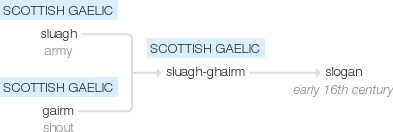Slogan
early 16th century: from Scottish Gaelic sluagh-ghairm, from sluagh ‘army’ + gairm ‘shout’.
wiktionary
From earlier sloggorne, slughorne, slughorn(“battle cry”), borrowed from Scottish Gaelic sluagh-ghairm(“battle cry”), from Old Irish slúag, slóg(“army; (by extension) assembly, crowd”) + gairm(“a call, cry”). [1]Slóg is derived from Proto-Celtic *slougos(“army, troop”), from Proto-Indo-European *slowgʰos, *slowgos(“entourage”); and gairm from Proto-Celtic *garman-, *garrman-(“a call, shout”), ultimately from Proto-Indo-European *ǵeh₂r-(“to call, shout”). The English word is cognate with Latin garriō(“to chatter, prattle”), Old English caru(“anxiety, care, worry; grief, sorrow”).
etymonline
slogan (n.)
1670s, earlier slogorne (1510s), "battle cry," from Gaelic sluagh-ghairm "battle cry used by Scottish Highland or Irish clans," from sluagh "army, host, slew," from Celtic and Balto-Slavic *slough- "help, service." Second element is gairm "a cry" (see garrulous). Metaphoric sense of "distinctive word or phrase used by a political or other group" is first attested 1704.
